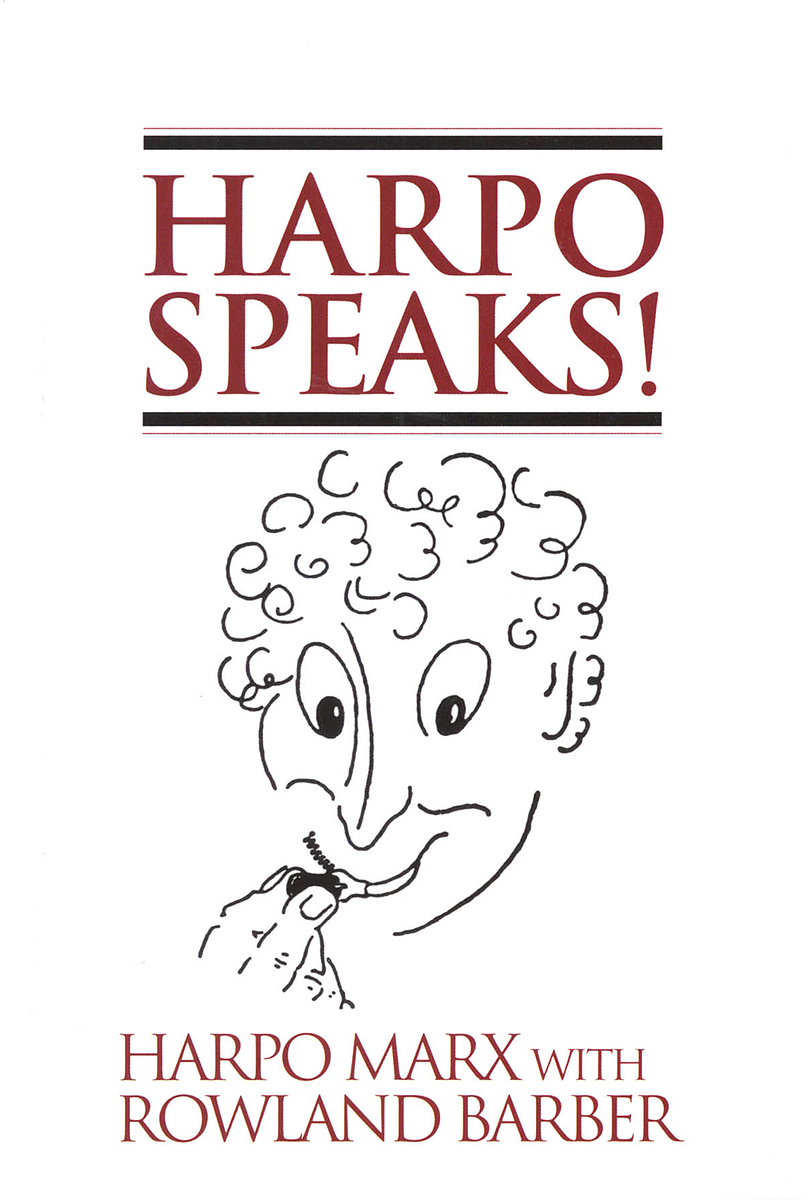My best friend and I were sharing a room on a family vacation to The Outer Banks and, since we couldn't sleep, we channel surfed. When we came to a late night AMC presentation of Animal Crackers, there was something magical and delightful and just plain insane about it that compelled us to sit and watch the whole thing. From that moment on, I was hooked.
Fast forward ten and change years later: I'm visiting NYC to see a couple of friends before I move out of the country. One friend learns I haven't ever read Harpo Speaks! and orders it for me on Amazon during lunch, as a combination early going-away/belated birthday present.
This is all to say this book is particularly special to me for a few reasons and it would be special even if it were terrible.
I'm happy to say it isn't.
Of course, it would be difficult to imagine a biography from a Marx brother that wouldn't be at least interesting. Theirs were lives of a bygone era: of the Jewish immigrant experience in New York city at the turn of the century, of the Roaring Twenties and the Great Depression and both World Wars, of the vaudeville circuit and the reign of the theater in the entertainment world. But brother Harpo (with some assistance from Rowland Barber, though how much I have no idea) has a keen memory and a knack for spinning a yarn. His good nature and good humor shine through almost every anecdote. I am fond of this one in particular, which takes place after a triumphant tour in England. The brothers have returned to America and had a falling-out with their producer, leaving them unable to book their by-now highly successful, famous act in any but remote, two-bit theaters.
While waiting and hoping, I went for an aimless walk in the outskirts of Indianapolis. I was depressed, and confused, and I had to be alone. I kept telling myself that something good always happened every time I hit bottom. But I didn't believe it. What could happen? What could I do? Groucho could go back in vaudeville as a single. Zeppo could go back to Chicago with Minnie, where he'd have no trouble finding a job. He was the only high-school graduate in the family. Chico could land a job as a piano player, on his own terms, anywhere.
But me? What was I trained to do besides being a Marx Brother? Well, I could play the harp on a New York City ferryboat, for nickels and dimes. Beyond that, nothing.
...
It was the only time I ever felt sorry for myself.
I came out of my daze. I was startled to find I was standing watching an auction sale. The inventory of a little general store in the suburbs—groceries, notions and dry goods—was being auctioned off. There were about twenty people there. They must have been jobbers, mostly, because the auctioneer was knocking down the stock in big lots. I was careful to keep my hands in my pockets, so I could resist any crazy impulse to make a bid, and blow my entire capital of seven cents.
The shelves were nearly emptied out and most of the crowd had left, but I still hung around, having nothing better to do with myself. Finally everything was gone except one scrub brush, the former owner, hovering in the background, the auctioneer, myself, and an elderly Italian couple. The elderly couple had been there all the time. Either they had no money or they were too timid to make a bid on anything. Whichever it was, they exchanged sad looks now that the auction was winding up.
The auctioneer was tired. "All right," he said. "Let's get it over with and not horse around. I have left here one last desirable item. One cleansing brush in A-number-one, brand-new condition, guaranteed to give you floors so clean you can eat off them. What am I offered?"
The old Italian guy and his wife looked at each other, searching for the key to the right thing to say. The auctioneer glared at them. "All right!" he yelled. "It's only a goddam scrub brush!" They held on to each other like they had done something wrong.
I said, quickly, "One cent."
The auctioneer whacked his gavel. He sighed and said, "Sold-thank-God-to-the-young-American-gentleman-for-one-cent."
I picked up my brush and handed it to the old lady. She was as touched as if I had given her the entire contents of the store. The old man grabbed my hand and pumped it. They both grinned at me and poured out a river of Italian that I couldn't understand. "Think nothing of it," I said, and added, "Ciao, eh?"—which was the only Italian I could remember from 93rd Street.
They thought this was pretty funny, the way I said it, and they walked away laughing. I walked away laughing too. A day that had started out like a nothing day, going nowhere except down, had turned into a something day, with a climax and a laugh for a finish. I couldn't explain it, but I hadn't felt so good in years. A lousy penny scrub brush had changed the whole complexion of life.That is the whole book in a nutshell, and that is why I find myself compulsively reading it any chance I get. In an age when it seems like every beloved comedian and actor is hiding some terrible, predatory dark side, it's nice to spend time with one who has nothing but good cheer and humanity to offer.
It's also my secret fear that my generation will be the last to have anyone appreciate the Marx Brothers, so I do my best to signal boost whenever possible. American comedy owes so much to all of them.


No comments:
Post a Comment